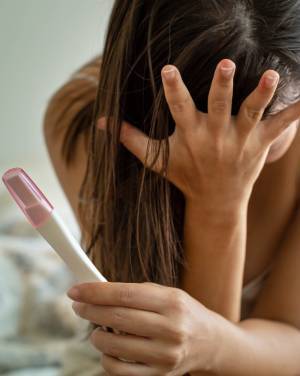Why You Can Get Pregnant While Using Condoms and the Likelihood of This Happening
📊 Pregnant Using Condoms—What Are the Chances? Quiz
- Pregnant, even if you used a condom — how often does this happen? Between 2-12 in 100 women become pregnant using condoms as their sole contraceptive measure for one year.
- The most common reasons are material defects or mistakes in usage, e.g., choosing a size too small, causing the condom to tear.
- Are you concerned you may be pregnant despite using a condom? Or perhaps you just found out you are pregnant? This article is for you.
Pregnant Using Condoms—What Are the Chances? Quiz
Answer three multiple-choice questions to determine the likelihood of being pregnant. Your free evaluation will immediately appear on your screen.
Pregnancy with Condom: Probability, Causes, and Experiences
Pregnancies despite condoms are more common than expected. Condoms, like all contraceptives, do not guarantee complete pregnancy protection.
Chances of Getting Pregnant with a Condom
The Pearl Index measures the effectiveness of contraceptive methods. Its rate for the effectiveness of condoms is 2-12.
This means two to twelve in 100 women become pregnant while using a condom exclusively for one year.
Surprise Pregnancy Due to Condom Failure — Causes
Incorrect use and material defects are the leading causes of condoms tearing or leaking. There are multiple reasons for condom failure leading to a surprise pregnancy.
Possible Reasons for Condom Failure:
- The wrong size is used.
- They are damaged (e.g. while opening or during transport/exposure to sharp objects).
- They are put on incorrectly and do not stay in place.
- They may have slipped while being withdrawn from the vagina.
- They are used after the expiry date.
- They are stored incorrectly (e.g., exposure to heat).
- The instructions are not followed.
- The material is defective, causing tears despite correct use.
Surprise Pregnancy with Condom — Stories
Contraceptive failures are sometimes immediately apparent; at other times, they may only be noticed after intercourse. Surprise pregnancies without visibly torn condoms are rare. Pregnancies seldom happen when the pull-out method is used with a condom, i.e., he did not ejaculate inside her but removed his condom-sheathed penis beforehand.
Since no contraceptive is 100 percent safe, women repeatedly report becoming pregnant despite their partner using a condom perfectly.
This is Lisa's* story, which she related to her Profemina counselor:
"I am in a happy relationship which began six months ago. We use a mix of natural family planning (NFP) and condoms for contraception. Unfortunately, our condom broke a few Sundays ago. Since my period was three days late, I took a test today. And it was... positive!"
Pregnancy Scare Despite Protected Sex...
🤰🏻 "Could I be pregnant?" — Take the Online Pregnancy Test!
You may be reading this article because you are worried that something "happened" despite using a condom. This would be a very stressful concern!
Take a deep breath! Consider the exact reason for your suspicion: Did something go wrong with the condom? Are you noticing any signs of pregnancy? Is your period late? Perhaps this is causing you to feel anxious.
For more information, go to:
- What Are Typical Signs of Early Pregnancy?
- Conception: How Does Pregnancy Happen?
- Period while Pregnant — Is That Possible?
💊 Wondering whether to take the morning-after pill? Take the test!
How to Deal with the Uncertainty
- Even though it is easier said than done: For now, stay calm and wait until you can find out whether you are actually pregnant by taking a pregnancy test. Discover in these articles how home-pregnancy tests work and when to take them.
- Meanwhile, you can take our free Online Pregnancy Test. Identify your concerns and symptoms from the multiple-choice suggestions and receive a free evaluation!
Pregnant Despite Safe Sex — Now What?
If you just found out you are pregnant despite having used a condom, you might be wondering where to go from here. You are probably still reeling from the shock. The contraceptive failure may have gone completely unnoticed, making the surprise all the greater. You are probably flooded by all kinds of thoughts, questions, and emotions right now.
Three things to consider:
- 🕰 Take the time you need in order to make a good decision. Don't allow anyone or anything to put you under pressure! Instead, weigh all the options carefully. Step by step, discern the choice you can feel good about in the long run.
- ❤️ A good decision is made with heart and mind as equal partners. Don’t ignore your heart! Take your emotions as well as your thoughts into consideration. Ask yourself: What do I want? Could this difficult situation also hold an opportunity?
- 👩💻 You don't have to walk through this challenging time alone. Can you think of a safe person you would like to entrust yourself to? If you would like guidance during this time but can't think of anyone to approach, take one of the following tests and receive an immediate professional evaluation. The goal of these tests is to create a judgment-free setting in which you will have the freedom to find the path that is right for you:
- 👥 Discover your pregnancy personality by taking the Personality Test.
- ⛑ Where do I go from here? — Quick Answers Quiz
- ⚖️. Considering an abortion? Take the Abortion Test!
- 🧔🏻♂️ How do I respond if he does not want the baby? Test
FAQs
-
Like all contraceptives, a condom does not provide perfect protection against pregnancy. Pregnancy despite a condom can be attributed to application errors (wrong size, wrong covering, damage during unpacking) and, occasionally, material defects. These cause the condom to tear or leak. The so-called Pearl Index for condoms is 2-12, i.e., between 2 and 12 in 100 women who use this method of contraception exclusively for a year become pregnant.
-
If the condom has torn, it is possible that you could get pregnant. When you notice the "contraceptive failure," rinse with clear water or urinate to flush sperm and any pathogens out of the vagina. Other factors also play a role in whether a pregnancy is possible, e.g., whether the contraceptive failure happened during your fertile window. Take a pregnancy test to gain absolute certainty! You can take the test approximately 14 days after the sexual intercourse in question or as soon as your period is late.
If you are wondering whether the morning-after pill would be an option, click here for more information and decision-making tools.
-
A condom is no longer safe once the expiration date has passed. In this case, it should not be used.
Effectiveness is also compromised if the material is damaged (e.g., by sunlight, heat, or sharp objects). Incorrect use or the wrong size can also render a condom ineffective.

























